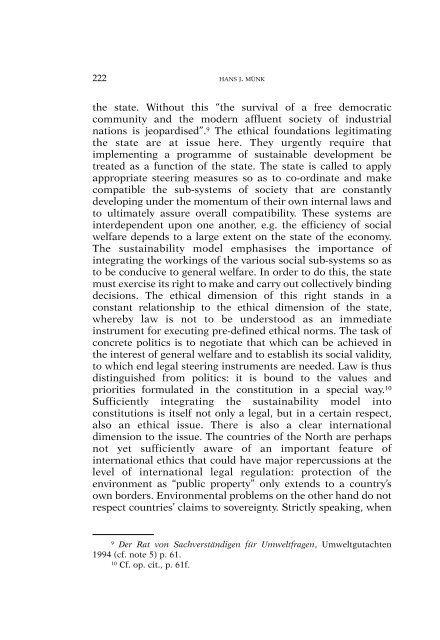Vol. XXXVIII / 1 - Studia Moralia
Vol. XXXVIII / 1 - Studia Moralia
Vol. XXXVIII / 1 - Studia Moralia
Create successful ePaper yourself
Turn your PDF publications into a flip-book with our unique Google optimized e-Paper software.
222 HANS J. MÜNK<br />
the state. Without this “the survival of a free democratic<br />
community and the modern affluent society of industrial<br />
nations is jeopardised”. 9 The ethical foundations legitimating<br />
the state are at issue here. They urgently require that<br />
implementing a programme of sustainable development be<br />
treated as a function of the state. The state is called to apply<br />
appropriate steering measures so as to co-ordinate and make<br />
compatible the sub-systems of society that are constantly<br />
developing under the momentum of their own internal laws and<br />
to ultimately assure overall compatibility. These systems are<br />
interdependent upon one another, e.g. the efficiency of social<br />
welfare depends to a large extent on the state of the economy.<br />
The sustainability model emphasises the importance of<br />
integrating the workings of the various social sub-systems so as<br />
to be conducive to general welfare. In order to do this, the state<br />
must exercise its right to make and carry out collectively binding<br />
decisions. The ethical dimension of this right stands in a<br />
constant relationship to the ethical dimension of the state,<br />
whereby law is not to be understood as an immediate<br />
instrument for executing pre-defined ethical norms. The task of<br />
concrete politics is to negotiate that which can be achieved in<br />
the interest of general welfare and to establish its social validity,<br />
to which end legal steering instruments are needed. Law is thus<br />
distinguished from politics: it is bound to the values and<br />
priorities formulated in the constitution in a special way. 10<br />
Sufficiently integrating the sustainability model into<br />
constitutions is itself not only a legal, but in a certain respect,<br />
also an ethical issue. There is also a clear international<br />
dimension to the issue. The countries of the North are perhaps<br />
not yet sufficiently aware of an important feature of<br />
international ethics that could have major repercussions at the<br />
level of international legal regulation: protection of the<br />
environment as “public property” only extends to a country’s<br />
own borders. Environmental problems on the other hand do not<br />
respect countries’ claims to sovereignty. Strictly speaking, when<br />
9<br />
Der Rat von Sachverständigen für Umweltfragen, Umweltgutachten<br />
1994 (cf. note 5) p. 61.<br />
10<br />
Cf. op. cit., p. 61f.
















